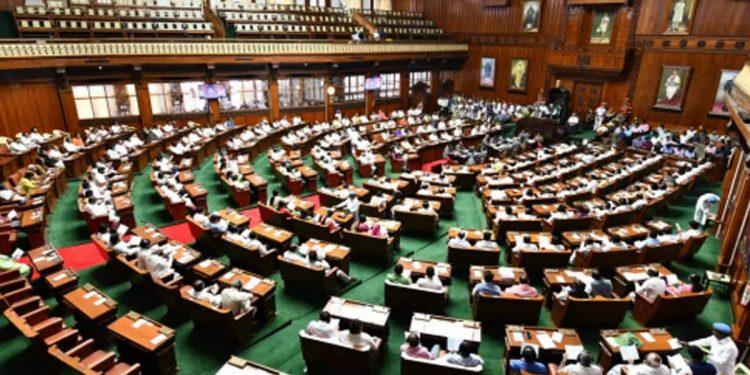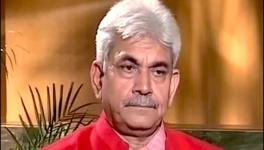Why the Karnataka Protection of Right to Freedom of Religion Bill is Unlikely to Pass Constitutional Muster

Karnataka Assembly
The Karnataka Protection of Right to Freedom of Religion Bill, 2021, recently introduced in the Karnataka Legislative Assembly, is blatantly unconstitutional, as it is in abrogation of Articles 14 and 25 of the Constitution of India, writes SAAHAS ARORA.
—————–
Back in November 1947, the provincial government of Central Provinces and Berar had enacted a Public Safety Act that recognised only those religious conversions that took place in the presence of a Magistrate. The legislative intent behind tabling this Act, as explained by R.S. Shukla, Prime Minister of the Province, in a letter written by him to President Rajendra Prasad in 1948, was to grip a religiously volatile environment where even a voluntary and bona fide conversion was understood as a forced conversion, and was highly likely to invite widespread furore. While this Act was a temporary one and was repealed a year later, its legislative logic and rhetoric have sneaked their way into the current realpolitik under the cloak of The Karnataka Protection of Right to Freedom of Religion Bill, 2021 which has raised eyebrows as to its constitutional validity.
Inter alia, the Bill seeks to protect the right to freedom of religion and further prohibits, rather controversially, the “unlawful conversion from one religion to another by misrepresentation, force, fraud, undue influence, coercion, allurement, or any other fraudulent means”. This legislative intent is given recognition in the Bill by a host of provisions that embody a substantial degree of arbitrariness and subsequently invite questions on its constitutional merits. There is a litany of reasons that will be presented here to bring to light the fact that the Bill, which is ironically titled The Karnataka Protection of Right to Freedom of Religion Bill, fails to pay even mere lip service to the right to freedom of religion guaranteed by the Constitution of India.
The Constituent Assembly, when it started discussions on the right to propagate religion and its components, was divided into two schools of thought. One believed that the right of propagation was a right conferred on the religious minorities to ensure their integration in India, and such a right should be exercised within the limits demarcated by the majority religious coterie. Historically, this philosophy was advocated to keep the Hindus within the fold, and considered the ‘group’ and not ‘individuals’ as the object of the right. The other school of thought considered religious conversion as a matter of the individual’s right of conscience and spirituality, thereby construing the ‘individual’ and not the ‘group’ as the object of the right.
The definition of the word “allurement” is extremely broad and gives more than ample room for (mis)interpretation. Going by the definition, a person offering a Quran or a Bible is also likely to come under the umbrella of “allurement” and thereby, could be penalised under the bill.
While the Constitution adopted the rationale of the latter, The Karnataka Bill seems to follow the former school of thought, which is indicative of the inherent constitutional lapses in the Bill.
Also read: Anatomy of anti-conversion laws: Parts I and II
Violation of Article 25
One of the most blatant lacunae is in Section 3 of the Bill, which states: “No person shall convert or attempt to convert, either directly or otherwise, any other person from one religion to another by use or practice of misrepresentation, force, undue influence, coercion, allurement or by any fraudulent means or by any of these means or by promise of marriage, nor shall any person abet or conspire such conversion”.
The bill defines the term ‘’allurement’ in Section 2(1)(a) so widely that it dents the constitutional mandate of Article 25 of the Constitution that guarantees to everyone the freedom of conscience and the right to profess, practice, propagate and religion of his choice provided it does not trample public order, morality, health and other provisions of Part III of the Constitution.
Section 2(1)(a) reads as follows:
“In this Act, unless the context otherwise requires,- (a) “Allurement” means and includes offer of any temptation in form of ,- (i) any gift, gratification, easy money or material benefit either in cash or kind; (ii) employment, free education in school or college run by any religious body; or (iii) promise to marry; or (iv) better lifestyle, divine displeasure or otherwise; or (v) portraying practice, rituals and ceremonies or any integral part of a religion in a detrimental way vis-à-vis another religion ; or (vi) glorifying one religion against another religion.”
Going by the definition, a person offering a Quran or a Bible is also likely to come under the umbrella of “allurement” and thereby, could be penalised under the bill. Moreover, in a religiously sensitive yet religiously motivated country like India, threats of “divine displeasure” are used as mere passing references on a routine basis. Thus, the presence of the word “divine displeasure” within the definition of ‘allurement’ will speciously raise suspicion on a very impractical and indiscriminate basis.
Fundamentally, the content of Article 25 is divided into two prongs, the right of the preacher to preach and propagate a particular religion and the right of conscience of the listener to host the propagation and convert if he deems fit.
The only available authority that possibly defends this legislative transgression is the Stainislaus dictum. Back in the 1960s, similar laws regulating conversion enacted by the respective governments of Orissa and Madhya Pradesh were resoundingly upheld by the Supreme Court in its judgment in the case of Rev. Stainislaus vs. State of Madhya Pradesh in 1977, in which the Court relied on an arguably flawed premise that Article 25 does not include the right to convert someone to another religion. Fundamentally, this premise is onerous as it includes within its ambit all conversions; surprisingly, even those that are completely voluntary and devoid of any force or fraud.
Tellingly, the dictum in Stainislaus failed to pay even mere lip service to the right of the preacher to preach and the right of conscience of the listener. In all fairness, it shall be a cerebral flaw to use the Stainislaus dictum as a binding principle to substantiate and concretise the constitutional legitimacy of the Karnataka Bill.
Violation of Article 14
Another red flag in the Bill is the Proviso to Section 3 which arbitrarily states “that if any person reconverts to his immediate previous religion the same shall not be deemed to be a conversion under this Act.” This automatically creates an erroneous distinction between those who want to convert to another religion and those who want to reconvert to their immediate previous religion. Under Article 14 of the Constitution, classification is only deemed to be reasonable if it is founded on the basis of intelligible differentia which distinguishes persons or things that are grouped together from those who are left out of the group, and this differentia has a rational nexus to the object which the law seeks to accomplish.
The Karnataka Bill creates an unfounded distinction between those who want to convert into another religion and those who want to reconvert to their immediate previous religion, instead of creating a distinction between those persons who have converted or want to convert voluntary and those who have converted or want to convert under any form of compulsion or duress.
The Karnataka Bill creates an unfounded distinction between those who want to convert into another religion and those who want to reconvert to their immediate previous religion, instead of creating a distinction between those persons who have converted or want to convert voluntarily and those who have converted or want to convert under any form of compulsion or duress. Fundamentally, the proviso bears no rational nexus to the object of the bill, which is ostensibly to prevent conversions that happen under misrepresentation, force, undue influence, coercion, allurement, or by any fraudulent means, thereby, making it violative of Article 14.
Also read: India Needs to Overhaul Laws on Interfaith Marriage and Religious Conversion
Runs counter to Puttaswamy decision of Supreme Court
Another controversial provision of the Karnataka Bill is Section 8, which mandates that a person who wishes to convert to another religion must give a declaration of the intended conversion at least 30 days in advance to the District Magistrate (DM) or Additional District Magistrate (ADM). Worse, Section 9 of the bill demands a converted person to submit a declaration of the conversion within 30 days of the conversion to the DM or ADM. A procedural commonality in both the sections is that after receiving the declaration, the DM shall notify the religious conversion “on the notice board of the District Magistrate and in the office of the Tahsildar calling for objections.”
This procedural requirement runs along the same lines as Section 4 of the Himachal Pradesh Freedom of Religion Act, 2006, which, when challenged in the Himachal Pradesh High Court, was held to be in abrogation of the right to conscience and right to privacy. The high court, in that case, held that a person not only has the right to conscience, the right to belief, and the right to change his belief but also possesses the right to keep his beliefs secret and that the State must have “very compelling reasons” in order to justify its invasion of someone’s right to privacy. Additionally, it was also held that the State holds “no right to ask a person to disclose his personal beliefs”, let alone mandate a declaration and subsequently stamp it on bulletin boards barring such instances where there is a potential threat to the public order, health, and morality.
The cocktail of this procedural infirmity, and the practice of giving a declaration prior to/post-conversion and its appalling manifestation via notice boards fractures the very essence of the right to privacy which forms the fulcrum of the Puttaswamy judgement.
Additionally, a careful reading of the Supreme Court’s landmark Puttaswamy judgement, where decisional autonomy of an individual was held to be an integral part of the right to privacy, will bring to light the fact that sections 8 and 9 of the Karnataka bill procedurally transgress the Puttaswamy dictum. In the judgement authored by Justice Sanjay Kishan Kaul, a four-fold proportionality test has been prescribed that needs to be passed in order to legitimise a State-initiated interference in an individual’s privacy. Among other things, it enlisted that “there must be procedural guarantees against abuse of such interference.” Unfortunately, there are no procedural safeguards that are guaranteed against the application of the procedure described in sections 8 and 9 that can bring the bill in consonance with Puttaswamy. Moreover, the cocktail of this procedural infirmity, and the practice of giving a declaration prior to/post-conversion and its appalling manifestation via notice boards fractures the very essence of the right to privacy which forms the fulcrum of the Puttaswamy judgement.
Also read: UP’s Law Prohibiting Conversion is Unconstitutional and Draconian
Other glaring lacuna
Another procedural infirmity in sections 8 and 9 is that the office of the DM is to call for “objections” to the conversion. Technically, this implies that the outcome of the conversion shall solely depend on the discretion of the citizenry and how convinced the DM is about the conversion. This strikes at the very heart of the right to conscience.
In colonial Rewa, no Hindu could convert to Islam when without the sanction of the government. Mahatma Gandhi was against this practise as he construed this as an unnecessary obligation on the part of an adult of full understanding to obtain the consent of the government, which will also be the sole authority to determine the bona fides of the conversion. Similarly, in the case of the Karnataka bill, the merit of the conversion solely depends on the discretion of the DM and the conscience of the person converting, despite him being an adult and capable of understanding the nature and consequences of his act, plays absolutely no role.
There are other glaring problems with the grammar of the Bill which makes it extremely arbitrary, half-baked, and loosely drafted. Section 5 prescribes an enhanced punishment of a minimum of three years extending up to ten years accompanied by a fine worth fifty thousand rupees if a conversion is in respect of, among others, a woman. Prima facie, this is an extremely arbitrary provision as, in practical application, it seeks to equate the vulnerability and probable gullibility of a woman, regardless of how educated she is or where she stands on the professional ladder, with that of a person who is a minor, of unsound mind, or one who belongs to the Scheduled Castes or Scheduled Tribes. This provision too fails to pass the muster of intelligible differentia and falls outside the scope of Article 14.
Section 12 astonishingly lays the burden of proof on the person who causes the conversion or abets it. This goes against the fundamental principle of criminal jurisprudence that predominantly lays the burden of proof on the prosecution and not the accused.
Another problematic provision is Section 12, which astonishingly lays the burden of proof on the person who causes the conversion or abets it. By principle, this is flawed as it goes against the fundamental principle of criminal jurisprudence that predominantly lays the burden of proof on the prosecution and not the accused.
Also read: Gujarat Anti-Conversion Law Takes Hit: Are UP, MP Next?
The bogey of forced conversions has dominated the political landscape in India of late; it is also indisputably true that some forced conversions have been effected by groups from all major religious communities here. However, the Bill, due to its slew of its legal and practical deficiencies, is definitely not an appropriate solution to the problem.
(Saahas Arora is a fourth year law student reading at the ILS Law College, Pune. He is a researcher at Goeman Bind HTO, an international law and public policy think tank. The views expressed are personal.)
Get the latest reports & analysis with people's perspective on Protests, movements & deep analytical videos, discussions of the current affairs in your Telegram app. Subscribe to NewsClick's Telegram channel & get Real-Time updates on stories, as they get published on our website.
























